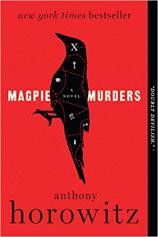Magpie Murders
Review
Magpie Murders
Cloverleaf Books’ most lucrative author, Alan Conway, has submitted his final Atticus Pünd whodunit. When he began the series, he emphatically promised nine Pünd mysteries, and Magpie Murders is the ninth. His editor, Susan Ryeland, settles in to read this last one over the weekend. She couldn’t have dreamed the impact it would have on her life.
“Magpie Murders really did change everything for me. I no longer live in Crouch End. I no longer have my job. I’ve managed to lose a great many friends. That evening, as I reached out and turned the first page of the typescript, I had no idea of the journey I was about to begin…”
While Susan devours the manuscript, so do we --- until page 213, where it abruptly breaks off. All of us are thoroughly enmeshed in the story, and suddenly we come to an end with the solution left dangling. Did Conway deliberately turn in an unfinished manuscript? Despite Susan’s dislike for their best client, that seems out of character even for a man as distasteful as Conway. But before she has a chance to confront him, she hears that he has killed himself. Perplexed, she decides to play amateur detective herself and go in pursuit of the missing pages.
"It ingeniously twists the reader’s mind in ways other mysteries don’t even begin to explore. Anthony Horowitz has presented an entirely new and challenging experience for lovers of the thriller genre."
In reality, Cloverleaf Books needs Magpie Murders in order to survive, so it is essential to find the story’s ending. In Susan’s digging, Conway’s long-buried secrets start to slowly surface. And as they do, the twinkling of an idea that his death might not have been a suicide begins to germinate. Susan soon finds herself in a whole different and very dangerous game with the possibility of a murder being tossed around.
Why don’t the police agree, though? To them, the case is cut and dried: The man jumped to his death. But maybe you have to look at Conway’s writing through a reader’s eye. He didn’t just write. He didn’t just pick characters’ names out of thin air. No, Conway placed hidden meanings in what he put on paper. He chose names using themes. He wasn’t satisfied to simply write a murder mystery; he amused himself with something of a story within a story. Like Sir Arthur Conan Doyle with Sherlock Holmes, Conway despised Atticus Pünd. Therefore, he peppered his books with inside jokes, often somewhat malicious. Even his famous detective’s name has a special connotation to Conway, one that describes the author’s hateful feelings about him. He toyed with his scenes and with his titles, almost to the point of playing cruel tricks on his readers. And now the clue to his death lies in Magpie Murders.
This is like getting two books in one, for there’s an entire mystery in the Atticus Pünd part, and a nearly parallel --- but contemporary --- universe in the other part, the one with the editor solving the murder. It ingeniously twists the reader’s mind in ways other mysteries don’t even begin to explore. Anthony Horowitz has presented an entirely new and challenging experience for lovers of the thriller genre. He has taken readers down a path we never even knew was there. Bravo!
Reviewed by Kate Ayers on June 8, 2017




